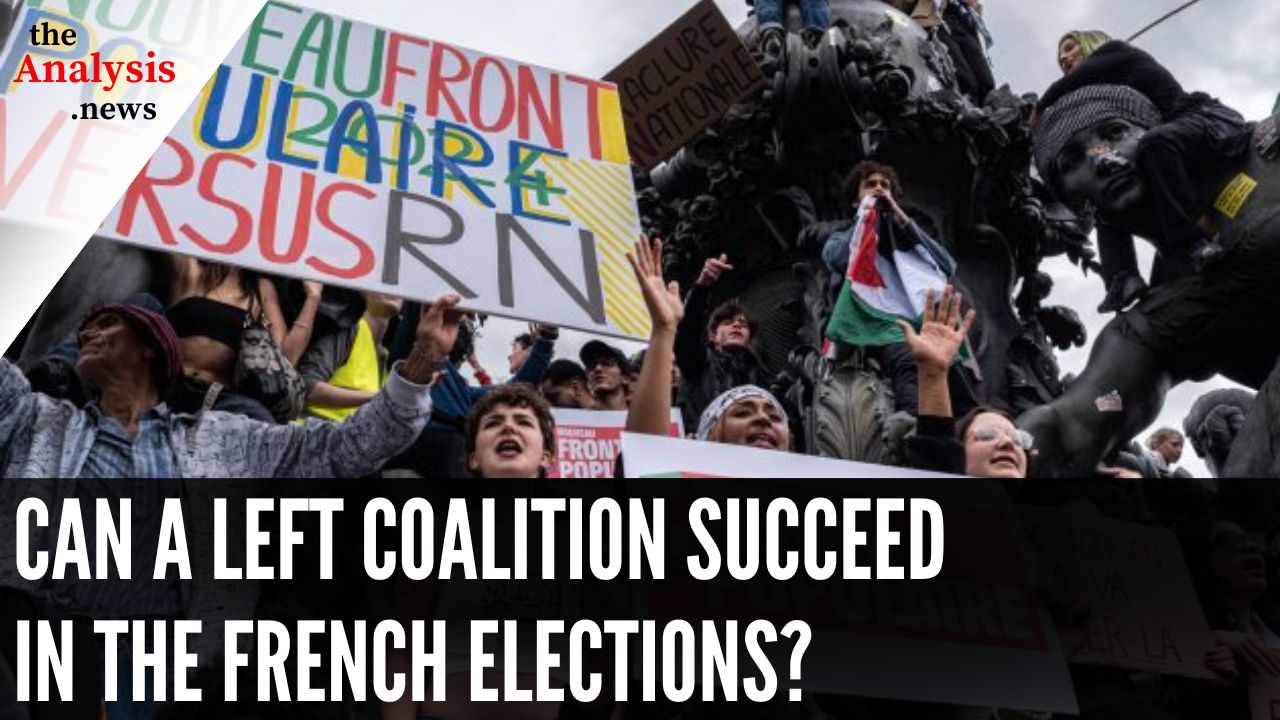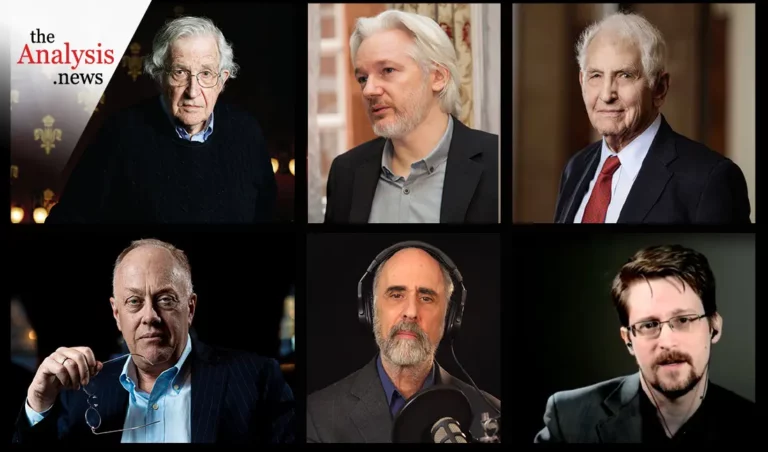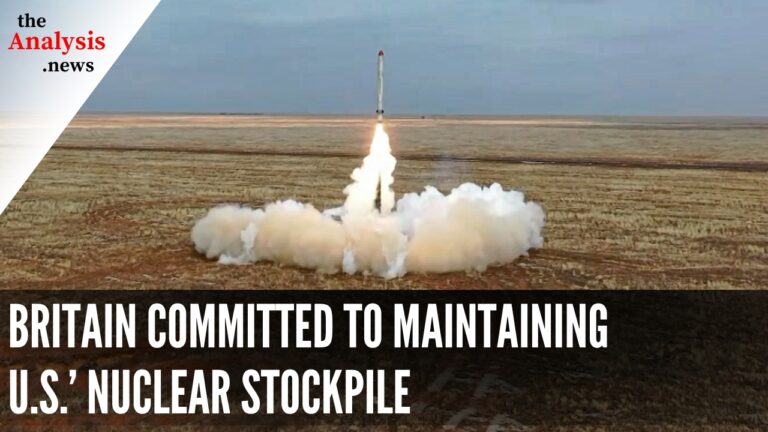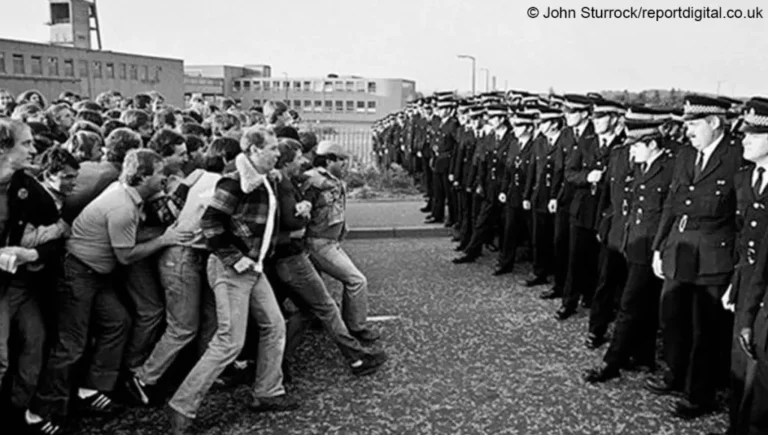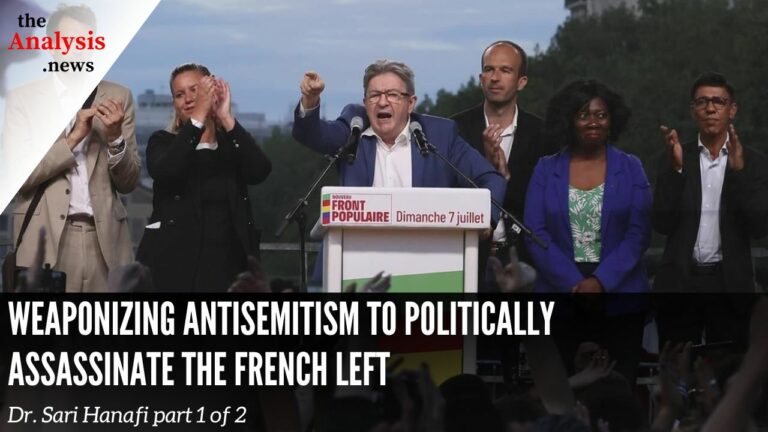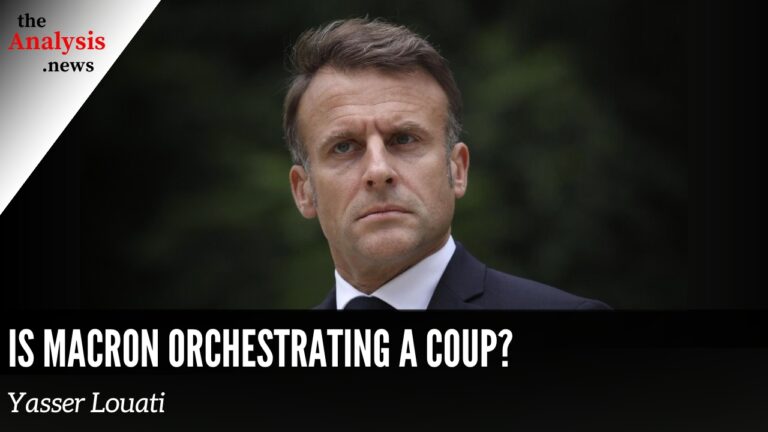Left Alliance Challenging Far-Right Takeover in France – Renaud Lambert
In recent EU parliamentary elections, Marine Le Pen’s far-right National Rally party won 31.4% of the vote, while the coalition representing President Emmanuel Macron’s Renaissance party garnered an embarrassing 14%. Renaud Lambert, journalist at Le Monde Diplomatique, contextualizes the rise of the far-right, and how President Macron’s decision to call snap legislative elections on June 30 and July 7 has prompted the left to form the New Popular Front, an unlikely coalition of four left-wing parties. Will this left alliance garner enough support to torpedo a far-right victory in the French parliament?
Talia Baroncelli
Hi, I’m Talia Baroncelli, and you’re watching theAnalysis.news. Today, I’ll be joined by Renaud Lambert to speak about the upcoming French legislative elections, which will be held on June 30 and July 7. These elections are held in two stages. After the results are out, we’ll have Renaud on again to speak about the implications of these results. You can watch this episode in the meantime to learn about the rise of the far right.
If you’d like to support the show, you can do so by going to our website, theAnalysis.news. Hit the donate button at the top right corner of the screen, and make sure you’re on our mailing list; that way, you’re always notified every time a new episode is published. You can like and subscribe to our show on YouTube, as well as on Spotify or other streaming services such as Apple. See you in a bit with Renaud.
Joining me now is Renaud Lambert. He’s a journalist who’s been writing for Le Monde diplomatique for several years and has joined us before on theAnalysis. It’s really great to have you on the show again, Renaud.
Renaud Lambert
Thank you, Talia. It’s great to be here.
Talia Baroncelli
I wanted to speak to you about Le Pen’s Party, the National Rally’s overwhelming victory in the recent European parliamentary elections, which were held between June 6 and 9. Le Pen’s Party won over 30% of France’s representation in the EU Parliament, and Macron’s Party, the Renaissance Party, only won 14% of those seats. So that was a much lower result compared to previous EU parliamentary elections.
In response to Le Pen’s party doing so well, Macron has called for snap legislative elections to be held on June 30 and July 7. Now, there’s been a lot of polling out. Polls aren’t always incredibly accurate, of course, but the polls are showing the far right to be doing really well in the upcoming legislative elections. It shows the National Rally, according to the Economist’s poll, at 37%. The New Popular Front coalition is currently at 29%. Ensemble, which is a coalition of centrist parties and center-right parties, including Macron’s Renaissance Party, at 21%.
Would you say that the rise of the right and Le Pen’s Party doing so well in the European parliamentary elections are something that has been a long time coming and that it was to be expected?
Renaud Lambert
The very high results of the National Rally were analyzed as a major surprise by the mainstream media because they were brought together with the snap election. We were described as the proverbial cat stuck in the middle of the road, staring at the car’s headlights, zooming towards it. The onus was on the people to decide what they were going to do in a very short time.
Now, I think in order to understand what is happening in France, you need to take a step back. That cat has been standing in the middle of the road for a long time, basically. This is one of the articles that is going to come out in Le Monde diplomatique next month. What we explain and what we suggest is that the first very good results recorded by the National Front, the ancestor of the National Rally, was in 1983 in the city of Dreux. It so happens that 1983 was the very moment when the Socialists in power in France since 1981 with François Mitterrand, who got elected on a platform of doing away with capitalism. Now, 1983 is the moment when they actually give up. The project of building Europe, the unified market, the logic of free trade, and neoliberal reform is imposed on the French population by the Socialist Party.
From that moment onwards, the left forgets what it was supposed to stand for and accepts; now, I’m thinking in very broad terms here, but it accepts to transform the social anger that globalization, little by little, is giving rise to. It accepts to transform it into some form of identity politics where religion, race, and where people come from become the major issue.
Now, if you fast forward to the recent election, what you have is basically the transformation of the political landscape where the extreme center that was responsible for globalization, the Socialist Party in France, the Christian Conservatives, they basically are in a situation where the only way for them to get re-elected over the last couple of presidential elections was to present themselves as the last wall protecting France from the far right. This has worked a couple of times with Macron in 2017 and again in 2022. But it’s come to a stage where people see that not only Macron does not prevent the far right from rising, but he actually helped the far-right put in place some of the measures that they were advocating for in the past.
The situation we found ourselves in after the European election has been a long time coming. The predicament, the conundrum we’re in, is something that’s been building over a long period of time. Now, the decision by Macron to decide on a very last minute snap election, it reinforces the difficulty because there’s no time. There’s no time to make that type of analysis. Political parties have got to adapt to a very, very, very tight calendar.
Talia Baroncelli
You do mention that there’s not that much time to adapt, and it seems like on the right, they’ve been scrambling. But the right has also changed. Le Pen’s party is slightly different than her father’s party. Her father, Jean-Marie Le Pen, was explicitly racist and fascist. I’m not saying that Le Pen isn’t herself, but over the past few years, I think she’s tried to dissociate her party from that rhetoric and to present the party as being neither right nor left but nationalist or nativist. What she really believes is obviously something that we can debate, but that’s how she’s been presenting the party. The National Rally now has Jordan Bardella, who’s a very young, 28-year-old, well-dressed gamer who is giving a new face to this party to try to perhaps attract younger voters. How do you assess this current party, the National Rally, and who else is also competing on the far-right in the upcoming elections?
Renaud Lambert
Well, basically, we had two strands of far-right, and one was led in part by Le Pen’s niece, and she has decided to ally with the National Rally, which means that basically, there’s a unified trend. Now, it’s true that there’s been a major effort to detoxify their image, but the roots are still there. The founders of the party are still related to French collaboration, to the anti-Algerian movement, and sometimes to Nazi militancy.
The National Rally, basically, has become a recipient of the general dissatisfaction with the way the world is going with the way globalization is affecting France. Now, some of their electorate are racist. There is no doubt about it. They might not all be racist for supremacist reasons. Racism might be their way of translating the difficulty they’re encountering with making a living and the fact that everything is enticing them to translate the fact that it’s not working for them into a problem to do with race because, basically, class struggle is totally absent. There’s no option to read the social difficulties and political problems in France through those lenses. The National Rally has been putting forward a platform that, in many aspects, touches on claims made by the left.
For instance, Macron was responsible for a very severe pension reform. The National Rally has been claiming that it was going to do away with that law, with that reform. That’s very popular because people hate that reform. We took to the street. Macron had to prevent the National Assembly from voting in order to get that passed. But it so happens that last night, there was a debate on French television. Jordan Bardella, whom you mentioned, who is leading the campaign for the National Rally, was cornered into saying that in actual terms, in reality, what he is planning is not a reform of that and not to do away with that reform; it’s to make it even worse.
Now, in many respects, they are hiding their games, and it’s becoming apparent. Every week, every day, they have to take a step back from some of the promises they made.
Talia Baroncelli
I do want to ask you about that if I can interrupt because I know in the past, we were speaking about the pension reform and the protests surrounding that. I think it was last week when I saw Bardella speaking, and he did say that he supported this pension reform but that they would first have to reassess the national budget to see if they even had money to essentially implement such a reform. It seems like what the right usually does is capitalize on the concerns of the working class and the middle class due to rising inflation and the cost of living going through the roof. When it actually comes to them wielding power or making legislative changes, they actually are more on the side of maintaining these sorts of neoliberal status quo institutions in a way and not doing away with those sorts of reforms. Do you think that’s because he really does think that they will be elected and that they’ll have legislative power? Maybe you can also explain, before we get to the left, what the different scenarios could be if Le Pen’s party does not attain an absolute majority.
Renaud Lambert
Well, France really looks like a massive question mark at the moment. No one really knows anything about anything. One of the hypotheses is that the National Rally is not really keen on winning the next election. It was not in the cards for them. Our viewers need to know that in 2027, France is due to have a presidential election, and France is a very presidential regime. What the National Rally wants is the presidency. If we didn’t have any snap election, in all likelihood, they would have got the presidency and a majority in the National Assembly.
Now, what they have to do is to try… they’re campaigning, and they have to keep up the discourse that appeals to the popular vote. But at the same time, they have to convince the private sector that they’re going to play ball with what they want.
There was an article on front page of the Financial Times last week saying the National Rally is receiving calls from big players in the private sector. What exactly are you planning? They have to clarify for the private sector at the same time as unfolding exactly what that platform is for. Some discrepancies are coming to the surface.
Now, you asked me about the various scenarios. Like I said, France is a question mark at the moment. In order to get an absolute majority, a party needs to win at least 289 seats in a 577-seat assembly. Now, the National Rally might win this. It’s a possibility. The extreme center might. It seems very unlikely at the moment, but things are changing so fast that no one really knows. The left coalition that has been able to emerge in a very short period of time might be able to do quite well. Now, this would be positive because it’s always better if the left wins. There are some difficulties with that scenario as well, which perhaps I can dive into later on.
Talia Baroncelli
We should just mention who has actually formed that electoral pack on the left, and that’s the center left, Socialist, the Greens, the Communists, and Jean-Luc Mélenchon’s Party, France Unbowed [La France Insoumise].
Renaud Lambert
Exactly. It extends, for instance, amongst the candidates because what we are going to elect is not a Prime Minister. We’re going to elect members of parliament. If each political unit is going to elect a member of parliament, some of them have been nominated by the Popular Front. But amongst those nominees, you have people from the radical left, and you have, for instance, former President François Hollande, who himself has been responsible for some of the worst work law reforms we’ve known in France, who has accompanied the neoliberal turn in France from the very beginning.
Obviously, this is going to lead to some difficulty if a member of that coalition gets to the prime ministership or becomes prime minister. France is already under a small attack from the market. They’re not too keen on uncertainty, and the National Rally is doing everything it can to reassure them. But still, there’s a level of unknown which the market doesn’t like. The difference between the French 10-year bond and the German 10-year bond is increasing, which is a sign of tension in the market. If someone from the Popular Front becomes Prime Minister, we’re going to be under attack from the market, and that block will need to be very strong to resist. It’s not giving signs of great strength at the moment. There’s a lot of internal division.
Now, there are another three scenarios that could happen because maybe no one is going to get an absolute majority. It’s going to be a relative majority. Now, what happens then? Bardella has already said that he will not accept to become Prime Minister, and one can understand because it would be a tricky situation. He wants to convince his electorate that life will change if they become elected. So it might pass. Someone from the Popular Front might be picked to try and form a coalition, but that will make the difficulties I just mentioned even worse. Not only will they have to compose with discrepancies within the Popular Front, they will have to align with forces that are to the right of them. The last scenario is Macron chooses someone from the extreme center, counting on the fact that some of them will just want to participate. He might be able to get people from the right, people who used to follow him, even people from the Popular Front who decide to jump boats in order to save the Republic from the danger of the far-right, decide to play ball with this. That gives them another lease of life until the presidential election of 2027.
Talia Baroncelli
I do have a bit more of a technical question because you were mentioning that there are lots of discrepancies within the Popular Front electoral coalition. There are four parties. You said that Hollande is even a member of it. Obviously, there are discrepancies between this neoliberal Socialist Party and Jean-Luc Mélenchon’s Party. They’ve been standing for Gaza and for the rights of Palestinians and also have been in favor of additional reforms that would alleviate the burden on the working class and improve wages for workers.
Do you see there being some additional difficulties? If this pact actually comes into power or has, let’s say, 28% of the vote in the National Assembly, in the parliament, but then at some point decides to actually disband so that they will no longer be an electoral pact of four parties, but decides to disband and to just represent their own political platforms individually, what would that mean for the actual parliament? Would that endanger the parliament at all, or would Macron have to call for additional parliamentary elections before the presidential elections of 2027?
Renaud Lambert
Macron is not allowed to call for another snap election for one year. The Constitution doesn’t allow him to do this. We’re stuck with the coming National Assembly for one year. Now, if the Popular Front coalition disbands, it aggravates the situation where they don’t have an absolute majority. They go from a relative majority to an even lower majority. For every single law project that they have, they have to rearrange a new coalition of people willing to vote for this.
Now, we’re talking about a political force that claims that it will be elected. I need to say that not only did they manage to unite under a single banner, but they’ve put together a very good program. Now, even the fact that François Hollande is there doesn’t change the fact the program is good, the platform is good. The problem is when the storm rocks the boat, what happens with François Hollande and the likes of him.
The thing is that I’ve talked about the history of the National Rally rising to where it stands now. What is needed to pierce that bubble is not just for the left to win and not change things. There’s a desire for massive change. The National Rally has managed to embody the promise of a change. Now, it’s the responsibility of the Popular Front to manage to begin such a change.
Now, an optimistic scenario is the following. Someone from the Popular Front does manage to be elected a prime minister with a sufficient majority. When a problem starts, an institutional problem internally, an economic problem externally, they put forward ambitious enough programs and laws that people take to the street, and people push for this. There is a precedent for this in France, which is being talked about quite a lot at the moment, which is the initial Popular Front of 1936, where the left actually managed to unite. They were not obviously compatible. But there had been a movement beforehand of strikes, of reorganization of the left in order to resist the rise of the far-right. When the left, in the end, managed to re-spark, and they’re on the moderate line, the popular pressure in the street was such that it was the very moment when some of the biggest social conquests were made in France in 1936. That’s the right scenario. In order for this to happen, a lot of planets will need to be aligned.
Talia Baroncelli
Just going back to how you would explain the rise of the right, a lot of people are talking about how the discourse has really changed, how there’s been this mainstreaming of far-right discourse so that the center-right and center parties are adopting this discourse, and playing into it. You’ve seen Macron talk hard on the border, on immigration, on even the right for the police to deploy violence against protesters.
Do you think that that’s playing into these election results that the media probably hasn’t been as discerning enough as they should? In certain instances, they’ve platformed or overplayed the importance of certain what you would maybe call high-profile cases of migrants committing crimes or certain violent acts and have blown that out of proportion in a way to sow fear in the population when it comes to immigration and to migrants coming from other parts of the Middle East or from Africa. That problem has become more of an issue for voters, even though in reality, there is no threat to the French nation posed by these people who are escaping really horrible conditions. They’ve been displaced. They’re also looking for work, so they’re not coming to undermine French values.
Renaud Lambert
I like your euphemism quite a lot. Yes, the media has not been as discerning as they might have been. The French media is in the large majority owned by billionaires, some of which have been openly pushing for the far-right. It would be insufficient to say that they’ve been campaigning for the far-right. They’ve been doing more than that over the years, exactly doing what you said, transforming every form of social discontent into something related to identity politics, religion, and the veil in France, the arrival of people from Africa, the threat of the French culture being replaced by something foreign and threatening. All studies show that France is gaining from immigration like most countries because people participate in the economy they pay taxes. But isolated cases have been used by the media to throw gasoline at the fire of socioeconomic anger that has been been transformed into something more related to identity politics.
Talia Baroncelli
Yeah, I think this is a problem that’s quite commonplace across Europe. You see that in Germany as well. There was recently a case where someone who came from Afghanistan when he was 13, I believe, ended up stabbing a police officer. Of course, it was an unfortunate event. It created this whole debate around, oh, Germany should be much harder on its rules for deporting people to Afghanistan, even if the Taliban is in power and there’s violence and horrible conditions there. That people should be deported back to conditions in which they could potentially face torture or other inhuman and degrading treatment. These are isolated cases that are overrepresented in the media. If you look at the actual statistics of violence committed by people who have migrated from other countries compared to the general population, it’s quite low. It’s not like there’s a higher level of violence perpetrated by people from migrant backgrounds or coming from other countries that aren’t in Europe.
This discursive tool has really functioned to make people believe that all of their problems are caused by these migration policies and that it’s not really austerity that’s been hurting their pockets and their bank accounts, and that they’re, in a way, misidentifying what the real cause is for the cost of living going up and for there being fewer jobs and not as many opportunities for people. I think it’s really important to point that out.
Renaud Lambert, I’m really happy that you were able to make time to join us. We might need another update at some point in the next few months if there’s any drastic changes with regards to the French legislative election. So, thanks so much for joining us again.
Renaud Lambert
Thank you for having me.
Talia Baroncelli
Thank you for watching theAnalysis.news. Stay tuned for our next interview with Renaud Lambert, where we’ll be discussing the actual outcome of these legislative elections. See you then.
Podcast: Play in new window | Download
Renaud Lambert is a deputy editor and journalist for Le Monde Diplomatique, a French monthly newspaper offering analysis and opinion on politics, culture, and current affairs.
